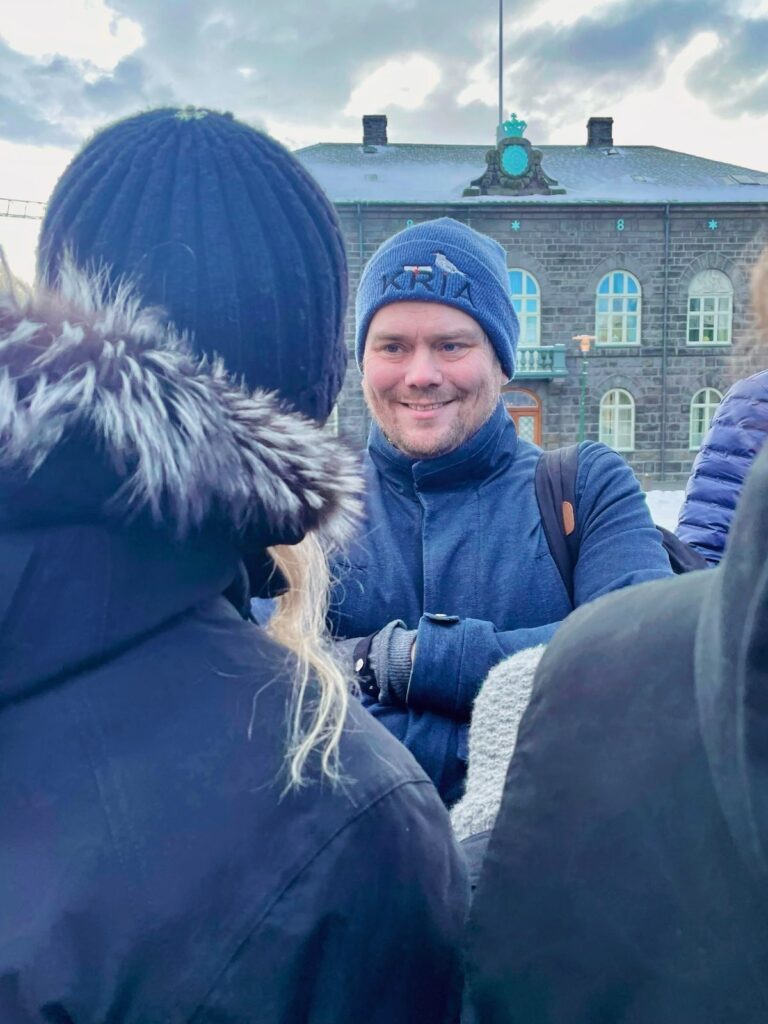Pirate Party member Andrés Ingi Jónsson says the government is falling behind other nations on queer healthcare.
Parlimentarian Andrés Ingi Jónsson of the Pirate party is pushing forward points on the queer agenda, asking for receipts. In the past few months alone he’s pressed other lawmakers on issues like rapid tests for STIs and blood donations for the MSM (men who have sex with men) community.
He, along with representatives from the Reform Party (Viðreisn) have also proposed a bill that would allow gender nonconforming and nonbinary people to register their last names in a gender neutral way. The draft bill is an amendment to previous legislation passed to improve the lives of trans people.
GayIceland chatted with Andrés to hear a bit about these movements and how much progress he’s making in a governing body that’s taken a long time to move on these issues..
When did you put forth Parliamentary Document 253 – Case 252, measures against sexually transmitted diseases? How did it come about?
“It was put forward just after the beginning of the fall session of Alþingi, this September. I’d planned to do it last spring after discussing the issue with someone who’s been active within Samtökin ‘78 for a long time – so the idea really comes from that conversation.”
This is an inquiry to the Minister of Health regarding measures against STIs. Has the Minister of Health done a sufficient job on this since getting into office?

“The ministry moves too slow on these issues. Not just STIs but various health issues that sometimes affect marginalized communities disproportionately.”
Andrés also mentions that this measure is being brought up for the sake of everyone affected by STIs, not just the queer community.
Andrés points out that Iceland also had the issue of HPV vaccinations, where the country was lagging behind our neighbors by only vaccinating girls, and by using an outdated vaccine. He brought up HPV vaccinations and MSM blood donations as oral questions to the new Minister of Health. This pressure seemed to work, in part, as last week Willum changed course and said the HPV vaccine needed to be revisited to make sure Icelanders were getting the most effective version available and that both young boys and girls got the jab.
When it comes to lagging behind our neighboring countries, Andrés says “the same can be said regarding the ban on MSM blood donations – the previous minister made its abolition a campaign pledge for the 2021 elections, but a year later nothing’s happened.”
Part of the reason Andrés is asking for a written response this time around is to keep people accountable. He says that there’s really no reason everyone is dragging their feet on these issues when they are common sense measures.
“It’s more about transparency. Written answers are publicly accessible, so by asking for one the minister’s policy on the issues raised in questions become part of the public record.”
The working group on this subject submitted a report in January of 2018. Why have these initiatives been dead in the water so long? Is it because of Covid?
“It’s hard to understand. The proposals of the working group are pragmatic and easily implemented suggestions from most of Iceland’s leading experts. Covid or not, four years is an unacceptable delay.
“Regarding the ban on MSM blood donations – the previous minister made its abolition a campaign pledge for the 2021 elections, but a year later nothing’s happened.”
Even if some STIs have disproportionately affected the queer community, this really is a general health issue. As the authors of the 2018 report point out, in past years many STIs have become more prevalent in Iceland than in our neighboring countries, which is why their proposals needed immediate attention.”
Rapid diagnostic tests for HIV and other STIs are not widely available in Iceland and not common in health centers especially the countryside. What needs to happen to change this? What risks are we taking by not having these rapid tests available now?
“Increasing accessibility of these tests is incredibly important for a number of groups; quicker diagnosis always has outsized benefits. Reaching out to these groups is much easier if point of care testing is made available – like for school nurses in secondary school, health care providers in prisons, or through grassroots organizations such as Samtökin 78 or Frú Ragnheiður (“a projects that offers clean injection equipment, condoms and advice on safe injection methods in order to prevent bloodborne diseases such as HIV and Hepatitis C”).”
“We can add to the list – the unacceptable wait for gender affirming surgery and, in fact, every bit of trans healthcare.”
Is Iceland falling behind other Nordic nations and other European nations in having this healthcare available?
“Iceland was falling behind in 2018, when the report came out. In the four years that have passed, the sexual health divide between countries has only increased.”
Do you feel the Minister of Health is dragging their feet on issues that relate to queer healthcare?
“Absolutely. And we can add to the list – the unacceptable wait for gender affirming surgery and, in fact, every bit of trans healthcare.”
Trans and nonbinary Icelanders gained quite a lot of rights with the 2019 Act on Gender Autonomy, but Andrés and members of the Reform Party feel that the job wasn’t done properly the first go round. Both the Pirate Party and Reform Party say that when the requirement for gender-segregated first names was removed from the Personal Names Act, the same was not done with regard to last or given names.
As it is currently Icelanders can change their first names irrespective of gender but their last names are still boxed in the Icelandic categories of “-son” or “-dóttir” (daughter). Andrés’ proposed a change that would allow anyone to alter their last name to “-bur,” a neutral way to say the child of a parent.
The proposed amendment would also change the language of the laws to be more gender inclusive removing “father” and “mother” in many cases and replacing them simply with “parents”.
Andrés hopes that these changes and common sense reforms to the healthcare system are resolved soon. In his eyes, these changes are long overdue.


